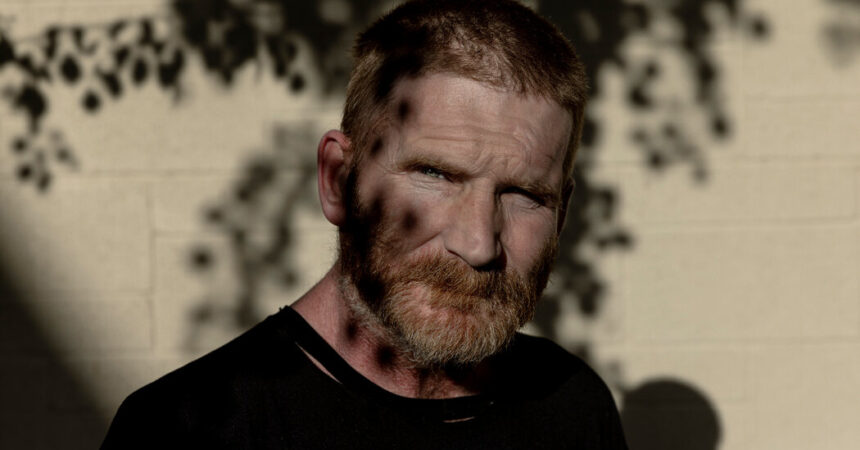5 years on the Phoenix streets battered Vance Blair’s physique. His imaginative and prescient dimmed, his speech slowed, and his palms started to twitch. A bulging pelvis revealed the necessity for hernia surgical procedure, and the vacant lot the place he slept was no place to maintain dressings clear.
Mr. Blair usually lingered by a shaded constructing, and several other ladies who labored there grew keen on the diffident man who requested permission to flee the solar. They introduced him meals and found his dilemma: Medicaid would cowl his operation, however hospitals discharge sufferers shortly and surgeons wouldn’t proceed until he had a spot to heal.
Then they realized {that a} Phoenix group runs what quantities to a nursing house for the homeless. Mr. Blair has remained there since his operation six months in the past and says the care may need saved his life.
“After some time of being outdoors, I used to be having ideas of not eager to dwell anymore,” he stated. “This place has been an excellent assist.”
Respite look after homeless folks is quickly rising, aimed toward folks nicely sufficient to go away the hospital however too sick for the road. Its rise displays the getting old of the unhoused inhabitants and the decade-long enlargement of Medicaid, which helps cowl the price. Many packages additionally get subsidies from hospitals or insurance coverage corporations wanting to shorten hospital stays or scale back readmissions.
The variety of packages, principally nonprofit, has roughly doubled since 2016, to greater than 165, based on the Nationwide Institute for Medical Respite Care. The motion has unfold to locations like Memphis; Missoula, Mont.; and Greenville, S.C., underscoring the ubiquity of homelessness.
With two 50-bed websites and a roster of clinicians, the Phoenix program, Circle the Metropolis, is among the most subtle. Sufferers have a mean age of 56 and our bodies that appear a lot older. They crowd the halls with wheelchairs, walkers, intravenous traces and colostomy baggage, markers of debilitation that with out shelter would carry the chance of an infection or assault.
Proponents of respite care hail the motion as a humanitarian crucial and a wise option to management well being care prices.
“We be certain folks have a humane place to go and maintain them from bouncing again to the emergency room,” stated Kim Despres, the chief government at Circle the Metropolis.
However some packages supply solely rudimentary care, extra like shelters than nursing houses. Critics concern the motion may divert sufferers into second-class convalescence and obscure the necessity for everlasting housing.
“Hospitals use respite care to get indigent sufferers off their books, after which they’re usually discharged again into homelessness,” stated Dennis Culhane, who research getting old and homelessness on the College of Pennsylvania.
Homeless sufferers needs to be cared for in licensed nursing houses, he stated, alongside the overall inhabitants.
A serious problem in respite care is what to do when sufferers get nicely: Many have nowhere to go. Caseworkers at Circle the Metropolis usually spend months serving to sufferers make plans, however excessive rents and the scarcity of housing support imply some return to the streets.
“It’s very scary for them to be with us for 2 or three months after which have to go away,” Ms. Despres stated.
A go to to Circle the Metropolis is a tutorial on the infirmity that may accompany homelessness. Sheila Meade, 62, makes use of a walker after a hysterectomy. Armando Sanchez, 42, misplaced 5 toes to diabetes. Quintin Alston, 62, had a hip changed. Kenson John, 50, a paraplegic, is recovering from poisonous shock. Till lately, all have been sleeping outside or in shelters.
It could be apparent that homelessness may cause well being issues. After years within the Phoenix solar, Mr. Blair, the hernia affected person, practically went blind from cataracts, which have been eliminated.
However well being issues may also trigger homelessness. Born with spina bifida, Lawrence Mora, 57, lengthy supported himself as a translator, however getting old left him unable to stroll and too depressed for full-time work. He was hospitalized with a kidney ailment and evicted from his condo the identical day.
He was discharged from the hospital to Circle the Metropolis and praises the psychological well being remedy it offered. “I may need the title ‘homeless,’ however we’re given a lot dignity,” he stated.
The getting old of the homeless inhabitants is a stark demographic shift.
In a forthcoming examine with Thomas Byrne, Mr. Culhane of the College of Pennsylvania discovered that by 2020 the biggest cluster of homeless males have been of their mid-50s, up from mid-30s three a long time earlier. The share of the inhabitants that was 60 and older had greater than doubled, to 19 %. He says the pattern displays the plight of late child boomers who matured amid deindustrialization and hovering housing prices, then carried the scars by life.
Margot Kushel, the director of the Benioff Homelessness and Housing Initiative at College of California, San Francisco, discovered that unhoused folks have the well being profiles of sufferers twenty years older, with comparable charges of incontinence, dementia and falls.
Worn by lives of poverty, weakened by excessive charges of dependancy and damage, and unable to handle treatable illnesses like diabetes and most cancers, they undergo mortality charges 3.5 instances these of the overall inhabitants, Dr. Kushel discovered.
By insuring an extra 15 million folks in or close to poverty — the principle danger pool for homelessness — the Medicaid enlargement that began with the Inexpensive Care Act of 2010 gave respite packages new methods to get well prices. 5 states, together with California, have federal permission to cowl respite care straight. In different states, respite packages can invoice Medicaid for discrete providers, like supplying wheelchairs or conducting exams.
Respite care has additionally grown, albeit extra modestly, within the 10 states which have rejected the Medicaid enlargement, pushed by sheer want. With much less funding, they have a tendency to supply fewer providers.
Circle the Metropolis, which opened in 2012, was willed into being by a Phoenix nun who sought donations with a shoe field. Now the nonprofit group has a $32 million funds and a workers of 260, together with physicians, nurse practitioners, licensed social staff and cellular medical vans.
“Navigators” stationed in seven emergency rooms assist handle homeless sufferers, searching for different care for many who don’t want admission and making discharge plans for many who do. Some native hospitals assist defray the price.
Housing, not medication, could also be respite care’s hardest take a look at. Most sufferers are too in poor health to work, lease subsidies are scarce, and plenty of have exhausted household support.
About three quarters of Circle the Metropolis’s sufferers go away with housing plans, together with sponsored flats, dependancy packages or non permanent stays with buddies, Ms. Despres stated. That also leaves 1 / 4 leaving for sidewalks or shelters, and others return to homelessness after their makeshift preparations dissolve.
Laborious circumstances abound. Mr. John, who’s paraplegic, is an undocumented immigrant. Mr. Alston, the hip affected person, has a homicide conviction. (He stated he killed somebody who had molested him as a teen.) Ms. Meade would dwell together with her daughter, however her daughter lives in a park — the identical park the place Ms. Meade lived for a decade.
“It’s a really advantageous steadiness, not eager to discharge them again into the road with no choices however not wanting to carry on to them too lengthy as a result of then we will’t deliver new folks in,” Ms. Despres stated.
Circle the Metropolis affords hospice care. Its terminally in poor health sufferers embrace Douglas Botsford, 57, who arrived in April with a failing coronary heart and a life story that he shares with a raconteur’s aptitude. It entails a gross sales profession in auto elements, a vindictive ex-girlfriend and an dependancy to methamphetamine that left him residing in his automobile together with his soul mate, a pit bull named Mia.
She died two years in the past after blinking goodbye in his arms. He suffered a coronary heart assault two days later and realized he had little time to dwell.
“My coronary heart died when my canine did,” he stated.
Hospitalized with one other coronary heart assault, Mr. Botsford was discharged to a shelter that might not look after him and despatched again to the hospital — the precise state of affairs that respite care seeks to keep away from. He assumed he would die on the road, till Circle the Metropolis provided care.
“I’m a really fortunate man to have the prospect to die right here,” he stated.
Mr. Blair, recovering from his hernia, counts himself fortunate, too. He went trying to find shade and located good Samaritans.
A taciturn man with a graying pink beard, he describes his life earlier than homelessness solely in faint element. The manufacturing unit the place he labored close to Cleveland closed. His girlfriend died. He couldn’t afford the condo they shared, and Ohio was too chilly for him to dwell outside. He took a bus to Phoenix and slept behind an Italian restaurant, soothed by the patio music.
“Being round folks is tough for me,” he stated. “I get lots of anxiousness emotions generally, panic assaults which are very powerful.”
He survived on meals stamps and picked up cans, however outside residing weathered his physique and planted darkish ideas. Ten days in a psychiatric hospital helped. Returning to homelessness didn’t.
When Tatiana Foss, 27, began working at a dermatology clinic in a constructing with a carport, she discovered a grizzled man with a mild method asking to sit down within the shade. His palms shook, and he moved his mouth as if chewing invisible gum. She admired his politeness.
With a co-worker, she launched him to the dermatologist, who handled a sore, identified the hernia and understood that Mr. Blair couldn’t get surgical procedure and not using a place to recuperate. Because it occurred, Ms. Despres, Circle the Metropolis’s chief, was among the many dermatologist’s sufferers. Mr. Blair received a mattress.
His keep could supply a route from homelessness. With a case supervisor’s assist, Mr. Blair has been identified with “severe psychological sickness,” which provides him precedence for sponsored housing with help providers.
Ms. Foss lately visited. A lady of soft-spoken empathy, she praised Mr. Blair for accepting psychiatric care — “it’s actually vital to maintain our psychological well being’’ — and expressed gratitude for his or her unlikely friendship.
“Thanks for letting me be a part of your journey,” she stated.
Mr. Vance clasped his shaky palms and stared on the ceiling as if trying to find phrases particular sufficient to convey his gratitude. Discovering none, he stated merely, “I thanks for all of your assist.”







